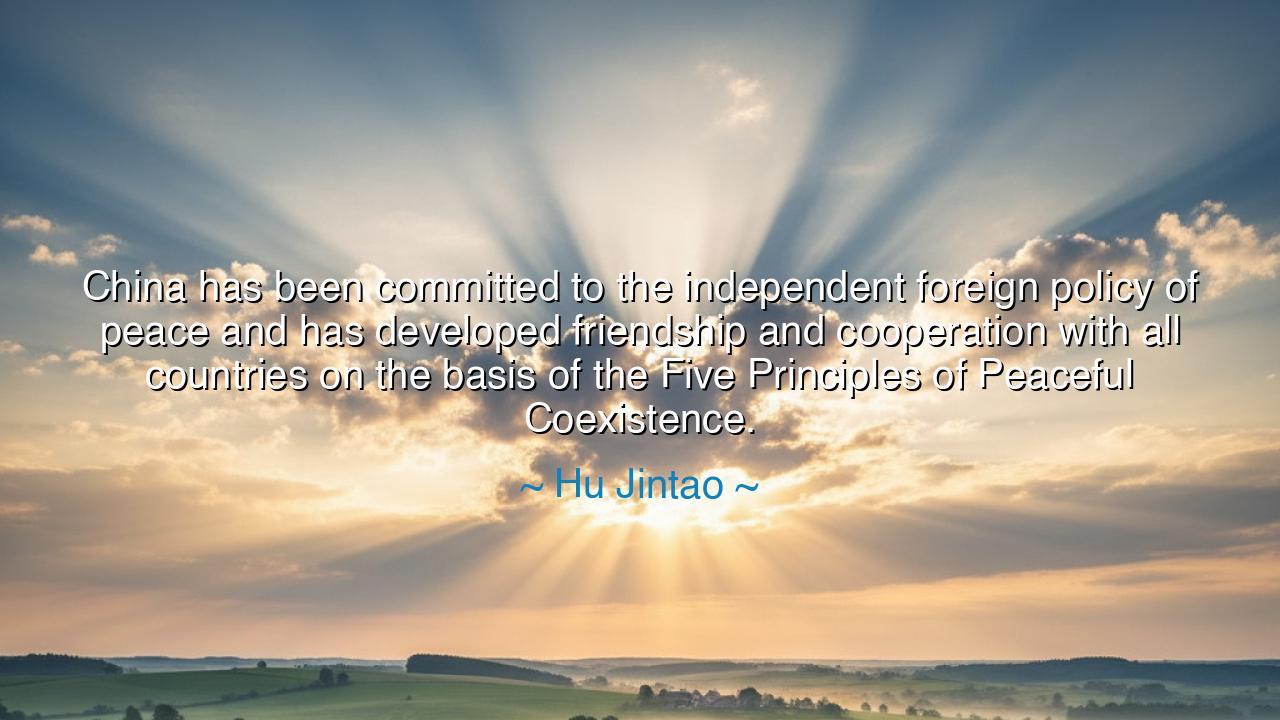
China has been committed to the independent foreign policy of
China has been committed to the independent foreign policy of peace and has developed friendship and cooperation with all countries on the basis of the Five Principles of Peaceful Coexistence.






“China has been committed to the independent foreign policy of peace and has developed friendship and cooperation with all countries on the basis of the Five Principles of Peaceful Coexistence.” With these words, Hu Jintao, former President of China, articulated not only a statement of statecraft but a moral creed — a vision rooted in harmony, respect, and mutual understanding among nations. His message echoes the wisdom of the ancients, for it reminds humankind that true strength is not found in conquest, but in coexistence, and that peace, when chosen freely, is the highest expression of power.
At its core, this quote is about balance — the balance between sovereignty and solidarity, between independence and interdependence. By emphasizing an independent foreign policy of peace, Hu Jintao reaffirms that peace cannot be dictated by others nor born of submission; it must arise from a nation’s conscious choice to act with integrity and goodwill. Such a policy does not reject strength — it refines it. A nation that stands firm in its principles while extending the hand of friendship to all becomes both unshakable and respected. Peace without independence is weakness, but independence without peace is isolation; the wisdom lies in uniting the two.
The Five Principles of Peaceful Coexistence, from which this philosophy flows, were first articulated in 1954 by China and India. They are: mutual respect for sovereignty and territorial integrity, mutual non-aggression, non-interference in each other’s internal affairs, equality and mutual benefit, and peaceful coexistence. These principles, though born in a turbulent century, carry the eternal voice of moral civilization. They mirror the Confucian ideal of harmony without uniformity — the belief that difference need not breed discord, and that coexistence can flourish even amid diversity. They are not merely diplomatic tools; they are ethical compasses for a divided world.
In the annals of history, those who have grasped this truth have built legacies of peace. One may recall Emperor Ashoka of ancient India, who, after witnessing the suffering of war, laid down his sword and ruled by Dharma, or righteousness. His edicts spoke of compassion, tolerance, and respect for all faiths — an early embodiment of peaceful coexistence. Centuries later, Hu Jintao’s words echo the same spirit, seeking a world where cooperation replaces confrontation and nations stand as partners, not predators. The lineage of peace stretches from Ashoka’s pillars of stone to the modern principles that guide diplomacy today.
Hu Jintao’s declaration also reflects a deeper truth about the nature of friendship among nations. Just as in human life, friendship is not formed through dominance or flattery, but through trust and equality. Nations that meet as equals can build bridges that last beyond treaties and leaders. This is why China’s commitment to these principles was not merely a political stance, but a moral vow — to grow through dialogue rather than division, to prosper without plunder, to protect peace as one guards one’s own home. It is a call to seek greatness not through control, but through contribution.
The lesson here is timeless and universal: true peace is active, not passive. It must be cultivated through respect, empathy, and restraint. Whether between nations or between individuals, coexistence requires discipline — the discipline to listen, to forgive, to cooperate even amid disagreement. The “Five Principles” can guide not only diplomacy but also personal conduct: respect others’ boundaries, avoid aggression, refrain from interference, seek fairness, and live peacefully. These are the foundations of harmony, from the smallest family to the grandest empire.
In practical life, we can embody these ideals by choosing understanding over argument, dialogue over pride, and cooperation over conflict. The one who practices peace does not surrender — they transcend. Just as nations grow stronger through mutual respect, so do individuals when they honor others’ paths without envy or intrusion. When we practice peaceful coexistence in our daily lives, we become the builders of a greater civilization, one where power serves compassion and wisdom governs ambition.
Thus, Hu Jintao’s words stand as both a political principle and a spiritual truth: that peace, freely chosen and faithfully upheld, is the highest form of strength. It is not the quiet of submission, but the calm of mastery — the serenity of a soul or a nation that knows who it is and seeks harmony with all. And so the teaching is clear: build friendship without fear, wield strength without harm, and let peace be not your strategy, but your way of life.






AAdministratorAdministrator
Welcome, honored guests. Please leave a comment, we will respond soon